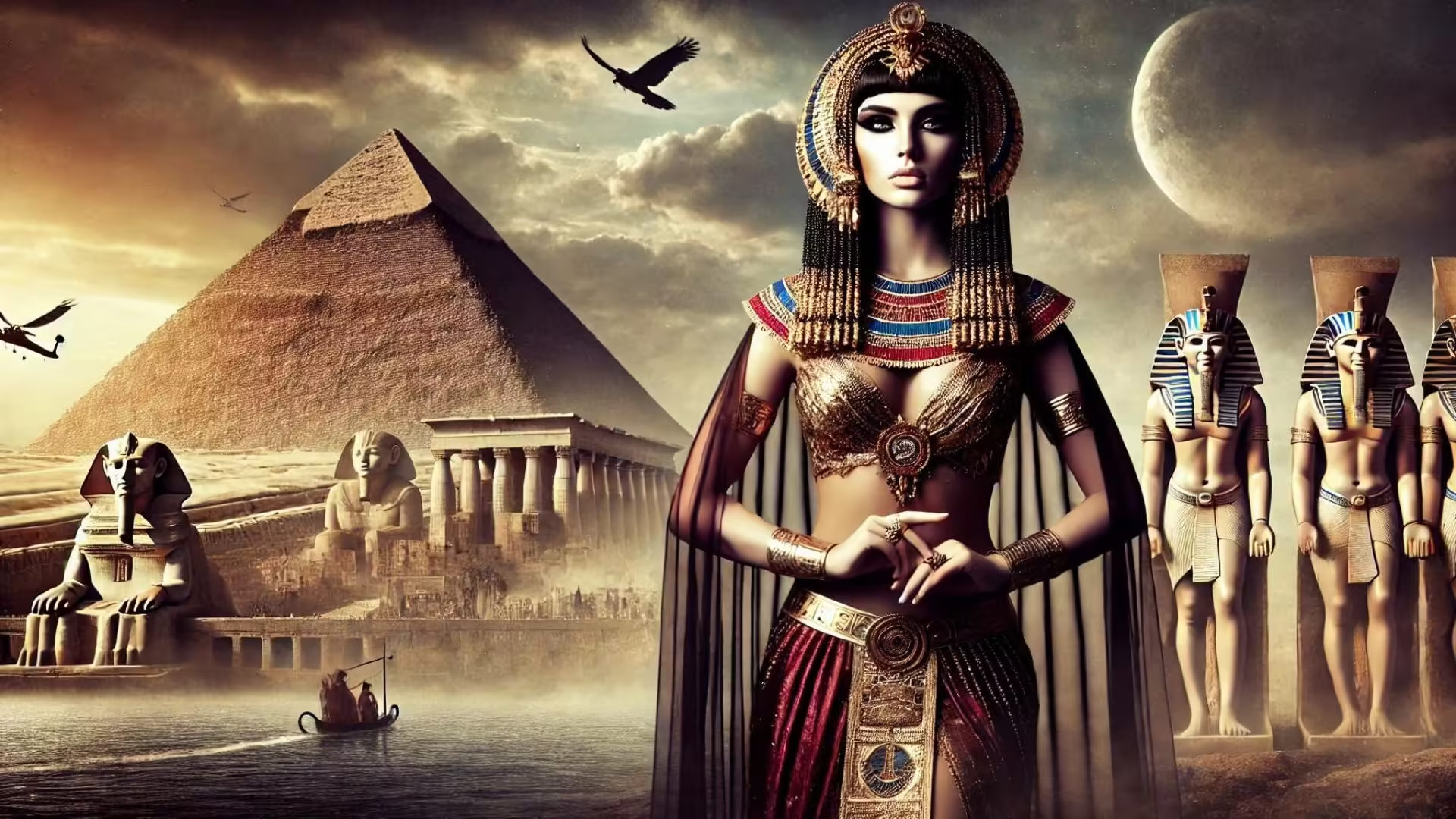Few figures in ancient history captivate the imagination quite like Cleopatra VII, the last Pharaoh of Egypt. Her life was a dramatic blend of political intrigue, romance, and tragedy, making her one of history’s most iconic and influential women. Cleopatra’s rise to power was nothing short of extraordinary, and her fall was just as spectacular, forever sealing her place in the annals of history.
Cleopatra’s Early Life and Rise to Power
Born in 69 BCE, Cleopatra belonged to the Ptolemaic dynasty, a Macedonian-Greek royal family that had ruled Egypt since the death of Alexander the Great. Despite her Greek heritage, Cleopatra distinguished herself by embracing Egyptian customs and becoming the first of her family to learn the Egyptian language. This connection to both her people and her royal lineage set the stage for her eventual rule.
When her father, Ptolemy XII, died in 51 BCE, Cleopatra and her younger brother Ptolemy XIII were left to rule Egypt jointly. However, Cleopatra, just 18 years old at the time, quickly became embroiled in a power struggle with her brother, who sought to sideline her and take sole control of the throne. Cleopatra fled to Syria, where she gathered an army, determined to reclaim her place on the throne.
Cleopatra and Julius Caesar: An Alliance of Power
Cleopatra’s fortunes took a dramatic turn when she met Julius Caesar, the Roman general who would become her ally and lover. In a famous and daring move, Cleopatra had herself smuggled into Caesar’s quarters, rolled up in a carpet, to make her case for Roman support. Caesar was captivated by her intelligence and charisma, and together they formed an alliance that would restore Cleopatra to power.
With Caesar’s military backing, Cleopatra returned to Egypt, defeating her brother’s forces and reclaiming the throne. The two rulers became lovers, and Cleopatra bore Caesar a son, Ptolemy XV, known as Caesarion. Their relationship not only secured Cleopatra’s position but also tied Egypt more closely to Rome’s growing power.
The Romance with Mark Antony and the Path to War
Following Caesar’s assassination in 44 BCE, Cleopatra’s political fortunes became even more intertwined with Rome. She aligned herself with Mark Antony, one of Rome’s most powerful leaders, and their romance became the stuff of legend. Antony and Cleopatra were not only lovers but also political partners, each seeking to expand their power.
Their union, however, was seen as a threat by Octavian, Caesar’s adopted heir and future emperor of Rome. Tensions between Octavian and Antony escalated, eventually leading to war. In 31 BCE, Antony and Cleopatra’s forces were defeated in the Battle of Actium, marking the beginning of the end for the Egyptian queen.
Cleopatra’s Tragic Fall
As Octavian’s forces closed in on Alexandria, Antony, believing Cleopatra had died, took his own life. In truth, Cleopatra was still alive, but the end was near. Rather than be paraded through the streets of Rome as a prisoner, Cleopatra chose to end her life in one of the most famous and dramatic acts of defiance in history. According to legend, she allowed an asp, a venomous snake, to bite her, thus bringing about her death.
With Cleopatra’s demise, Egypt fell under Roman control, marking the end of the Ptolemaic dynasty and over 3,000 years of Pharaonic rule. Cleopatra was the last Pharaoh of Egypt, and her death signaled the end of Egypt as an independent kingdom.
Cleopatra’s Legacy: A Story That Endures
Cleopatra’s life has been immortalized in countless works of art, literature, and film, from Shakespeare’s play Antony and Cleopatra to Hollywood’s grand portrayal by Elizabeth Taylor. Her intelligence, political savvy, and tragic love stories have captured the world’s imagination for centuries.
But beyond the myth and legend, Cleopatra’s influence on history is profound. As a ruler, she sought to protect Egypt’s sovereignty at a time when the Roman Empire’s power was growing. Her political maneuvering, alliances with two of Rome’s most powerful men, and her ability to maintain control over Egypt for as long as she did are testaments to her strength and resilience as a leader.
Cleopatra’s story is also a reminder of the complex roles women have played in history. She was not merely a figure defined by her relationships with powerful men but a shrewd leader in her own right, using every tool at her disposal—intelligence, charm, and diplomacy—to navigate the dangerous waters of ancient geopolitics.
The Importance of Cleopatra’s Story Today
Cleopatra’s rise and fall serve as a powerful narrative about the delicate balance of power, ambition, and identity. Her story continues to resonate because it touches on universal themes: the desire for power, the vulnerability of human relationships, and the tragic consequences of political conflict.
Today, Cleopatra stands as a symbol of female leadership and empowerment, her legacy echoing through the ages as both a cautionary tale and an inspiration. Her life may have ended in tragedy, but her story has endured for more than two millennia, continuing to fascinate, inspire, and challenge perceptions of power, gender, and history.
Cleopatra’s story reminds us that history is not just about battles and politics but about the people who shaped the world. The next time you encounter stories of great leaders, think about the complexity behind their choices and the lessons their rise and fall can teach us today.
Expand Your Vocabulary
- Pharaoh:
A Pharaoh was the title used by the rulers of ancient Egypt. In the article, Cleopatra is referred to as the last Pharaoh of Egypt. In modern contexts, we use this term mostly in historical discussions, but it can also symbolize ultimate leadership or authority. For example, “He ran his company like a Pharaoh, with absolute control.” - Dynasty:
A dynasty refers to a sequence of rulers from the same family. Cleopatra belonged to the Ptolemaic dynasty. In everyday language, we can refer to a family that holds power or influence for generations as a dynasty, such as the “Kennedy dynasty” in American politics. - Alliance:
An alliance is a formal agreement or partnership between two parties for mutual benefit. In the article, Cleopatra formed alliances with Julius Caesar and Mark Antony. We use this word when referring to collaborations, like in “The two companies formed an alliance to develop new technology.” - Charisma:
Charisma refers to a personal charm or appeal that influences others. Cleopatra’s charisma is highlighted as a key trait in gaining political allies. In everyday situations, someone with charisma can easily attract and influence people, like “The speaker’s charisma won over the entire audience.” - Intrigue:
Intrigue involves secret planning or plotting, often to achieve power. Cleopatra’s life was filled with political intrigue. In modern usage, intrigue can describe either a mysterious situation or political maneuvering, such as “The corporate intrigue behind the scenes led to a major shakeup.” - Romance:
Romance refers to a passionate emotional connection, often in a love relationship. In the article, Cleopatra’s romantic relationships with Julius Caesar and Mark Antony are key elements. We use this term in everyday language to describe love stories or affectionate relationships, like “Their whirlwind romance captivated everyone around them.” - Tragedy:
A tragedy is a disastrous event, often with a sorrowful ending. The fall of Cleopatra is depicted as a tragic end. In everyday speech, we use the term to describe both personal and large-scale sorrowful events, like “The sudden loss of the championship was a real tragedy for the team.” - Defiance:
Defiance means bold resistance or opposition to authority. Cleopatra’s act of committing suicide was an ultimate act of defiance against Roman domination. In common usage, defiance describes standing up against rules or norms, like “Her defiance in the face of unfair treatment inspired others to speak out.” - Sovereignty:
Sovereignty refers to the authority of a state to govern itself. Cleopatra fought to protect Egypt’s sovereignty from Roman control. In daily conversations, sovereignty is often used in political contexts but can also describe autonomy in any domain, such as “They valued the sovereignty of their personal decisions.” - Legacy:
Legacy refers to something handed down from the past, often a reputation or impact left behind. Cleopatra’s legacy continues to influence history and culture. In modern language, we often talk about the legacy of individuals or institutions, like “Her greatest legacy is the charity she founded to help disadvantaged youth.”
Let’s Talk:
- Cleopatra’s story is filled with political intrigue, romance, and defiance. Do you think she was a victim of circumstances, or did she have control over her fate?
- How do you think Cleopatra’s legacy has shaped modern perceptions of female leadership and power?
- Julius Caesar and Mark Antony played crucial roles in Cleopatra’s life. How different do you think her story would have been if she hadn’t formed alliances with these Roman leaders?
- Cleopatra’s tragic end is often romanticized in literature and film. Do you believe that her death was an act of defiance, or was it simply the inevitable outcome of her political decisions?
- The fall of Egypt marked the end of a dynasty and the rise of Roman control. How important do you think Egypt’s sovereignty was in Cleopatra’s decision-making?
- Do you think Cleopatra is remembered more for her political achievements or her personal relationships? How should her legacy be understood today?
- How do you think Cleopatra’s ability to embrace both her Egyptian and Greek heritage helped her navigate the complex political environment of her time?
- If Cleopatra were alive today, how do you think she would handle the political and social challenges of the modern world?
- What lessons can modern leaders learn from Cleopatra’s rise and fall in terms of navigating power, alliances, and personal ambition?
These thought-provoking questions are designed to encourage readers to reflect on Cleopatra’s story and its relevance in today’s world. Feel free to share your thoughts in the comments section or discuss them with friends and family!










0 Comments